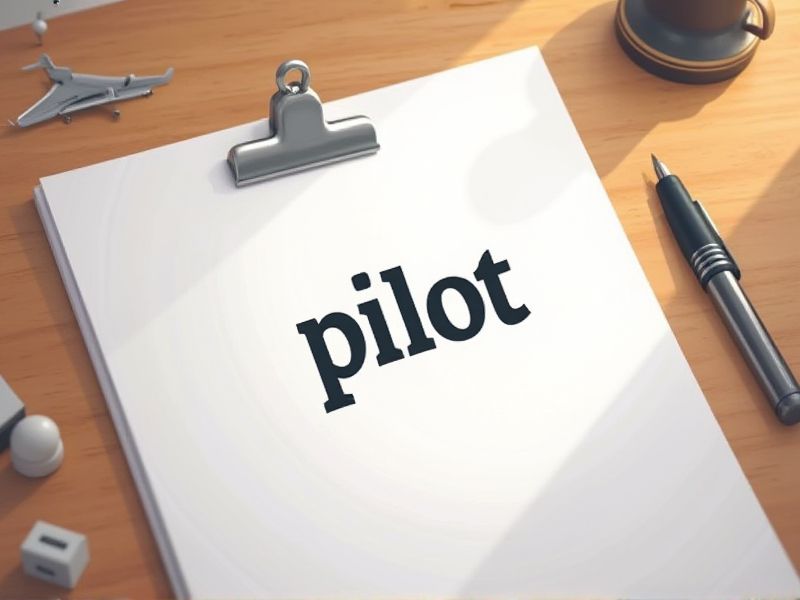
Pilots face complex flying environments that demand extensive knowledge and skill to ensure the safety of passengers and crew. Certifications validate a pilot's ability to handle various aircraft types and navigate challenging weather conditions. Regulatory bodies require specific credentials to maintain high standards in aviation safety and operations. Here's a look at some critical certifications required for airplane pilots.
Private Pilot License (PPL)
A Private Pilot License (PPL) is essential for airplane pilots as it serves as the foundational credential, verifying that they understand and can operate aircraft safely under visual flight rules. Through training required for a PPL, pilots develop crucial navigation and communication skills needed to manage complex situations in the air. Holding a PPL increases a pilot's knowledge of aviation regulations and meteorology, reducing the risk of accidents due to unforeseen weather conditions. A PPL also grants pilots the legal authority to carry passengers, expanding their potential operational and recreational flying opportunities.
Instrument Rating (IR)
Instrument Rating (IR) enhances a pilot's ability to navigate and operate an aircraft in poor weather conditions where visual references are limited or unavailable. It significantly improves safety by allowing pilots to fly in clouds or fog, reducing the risk of accidents due to spatial disorientation. IR is necessary for pilots who wish to fly under Instrument Flight Rules (IFR), enabling them to operate in controlled airspace and follow air traffic control instructions precisely. It also opens up career opportunities in commercial aviation, as many jobs require this rating to ensure a higher level of proficiency and skill.
Commercial Pilot License (CPL)
A Commercial Pilot License (CPL) is necessary because it legally permits pilots to receive payment for their flying services, forming the basis for a career in aviation. Regulations by aviation authorities, such as the Federal Aviation Administration (FAA), mandate a CPL to ensure that pilots meet specific safety and proficiency standards. The CPL training encompasses advanced aviation skills and knowledge, critical for managing complex flight operations and emergency situations. Pilots with a CPL are typically more equipped to handle diverse aircraft systems, enhancing industry trust and passenger confidence in air transportation.
Multi-Engine Rating (MER)
Multi-Engine Rating (MER) is critical for pilots seeking to operate aircraft with more than one engine, as it provides specialized skills to handle the complexities of multi-engine control systems. Completing MER training enhances a pilot's employment opportunities in commercial aviation, where larger and faster multi-engine planes are often used. Pilots gain crucial knowledge in handling engine failure scenarios, a vital safety component when flying multi-engine aircraft. Aircraft with multiple engines typically offer improved performance, range, and redundancy, necessitating MER for professional operation.
Airline Transport Pilot License (ATPL)
The Airline Transport Pilot License (ATPL) is required because it certifies that pilots have the highest level of aeronautical knowledge and flight experience, ensuring passenger safety. Regulations mandate the ATPL for pilots to command an aircraft carrying commercial airline passengers, reflecting the complexities of leading a multi-crew environment. ATPL training includes advanced navigation, flight planning, and system management, thereby equipping pilots to handle diverse flight conditions. Airlines rely on ATPL qualifications to meet strict international aviation standards and maintain operational legitimacy.
Type Rating
Airplane pilots need a type rating to legally operate complex aircraft, as it ensures they possess the necessary skills for specific models. Different aircraft have unique systems and handling characteristics, requiring specialized training. The Federal Aviation Administration mandates type ratings to enhance overall flight safety by standardizing pilot proficiency. Airlines prefer hiring type-rated pilots to minimize training time and cost for fleet-specific operations.
Flight Instructor Certification
Flight Instructor Certification ensures that pilots have advanced knowledge and skills necessary for teaching others. Being certified validates a pilot's ability to effectively communicate complex aviation concepts. Certification is also a regulatory requirement to maintain safety standards within aviation training environments. It enhances the instructor's understanding of flight dynamics, which directly influences the quality of training provided to new pilots.
Crew Resource Management (CRM) Certification
Crew Resource Management (CRM) Certification is crucial because it enhances pilot communication and teamwork, which are essential to managing the complexities and challenges of flight operations. The certification helps in reducing human errors by fostering effective decision-making and problem-solving skills in high-pressure environments. It provides structured training that focuses on leadership, workload management, and situational awareness, contributing significantly to flight safety. Regulatory bodies and airlines prioritize CRM training as a standard due to its proven effectiveness in minimizing accidents and improving safety records.
Upset Prevention and Recovery Training (UPRT) Certification
The UPRT Certification addresses the primary cause of many aviation accidents by equipping pilots with skills to handle unexpected aircraft upsets. Without proper training, pilots might not effectively manage situations leading to loss of control, a significant factor in fatal incidents. Regulatory bodies, observing data-backed trends, have made UPRT certification a mandatory aspect of modern pilot training programs. Pilots with this certification demonstrate enhanced safety and decision-making capabilities during critical phases of flight.
Basic First Aid and CPR Certification
Pilots often encounter medical emergencies during flights, and having basic first aid and CPR certification can enable them to provide immediate care until professional medical help is available. The ability to manage acute health issues in the air can increase passenger survival rates and improve overall flight safety. Updated certification ensures pilots remain proficient in the latest first aid techniques, aligning with evolving aviation safety standards. Airlines can demonstrate a commitment to passenger welfare by requiring pilots to have these certifications, enhancing trust and confidence in their services.
Summary
By obtaining additional certifications, you increase the trust and assurance passengers have in your skills and safety knowledge. Certifications often lead to enhanced career prospects, positioning you for promotions or opportunities with larger airlines. Advanced training hones your ability to handle complex flying scenarios, reducing accident risks. Your certifications also contribute to maintaining industry standards and encouraging continued professional growth.
